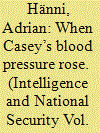| Srl | Item |
| 1 |
ID:
172494


|
|
|
|
|
| Summary/Abstract |
This article contributes to the understanding of the emergence, character, and significance of conspiracy theories on state–terrorism relations by providing a historical case study on the “Carlos–KGB [Komitet gosudarstvennoy bezopasnosti] conspiracy theory”: the fictional narrative that the “super-terrorist” Carlos the Jackal was an agent of the KGB, exploited against the Soviet Union's Cold War enemies. The analysis shows that the stories originated from disinformation operations of Western intelligence services, which were then spread by the news media, politicians, and Carlos himself. The mythical Carlos simulated through Cold War psychological warfare is deconstructed as a symbol of Soviet control of international terrorism.
|
|
|
|
|
|
|
|
|
|
|
|
|
|
|
|
| 2 |
ID:
149295


|
|
|
|
|
| Summary/Abstract |
This article contributes to the debate on the politicization of intelligence with a case study of a major attempt of politicization that so far largely escaped academic attention: the Special National Intelligence Estimate on the Soviet Union’s role in international terrorism produced by the US Intelligence Community in spring 1981. Despite direct and indirect manipulation by members of President Reagan’s Cabinet, this case differs from those usually discussed in a decisive way – politicization failed. Based on the empirical analysis, a theoretical model of intelligence politicization is introduced that extends Joshua Rovner’s oversell model, which can explain why policymakers demand intelligence support but is insufficient due to its exclusive focus on the consumers of intelligence, by integrating the incentives of intelligence producers and specifying the determinants of whether politicization succeeds or fails.
|
|
|
|
|
|
|
|
|
|
|
|
|
|
|
|